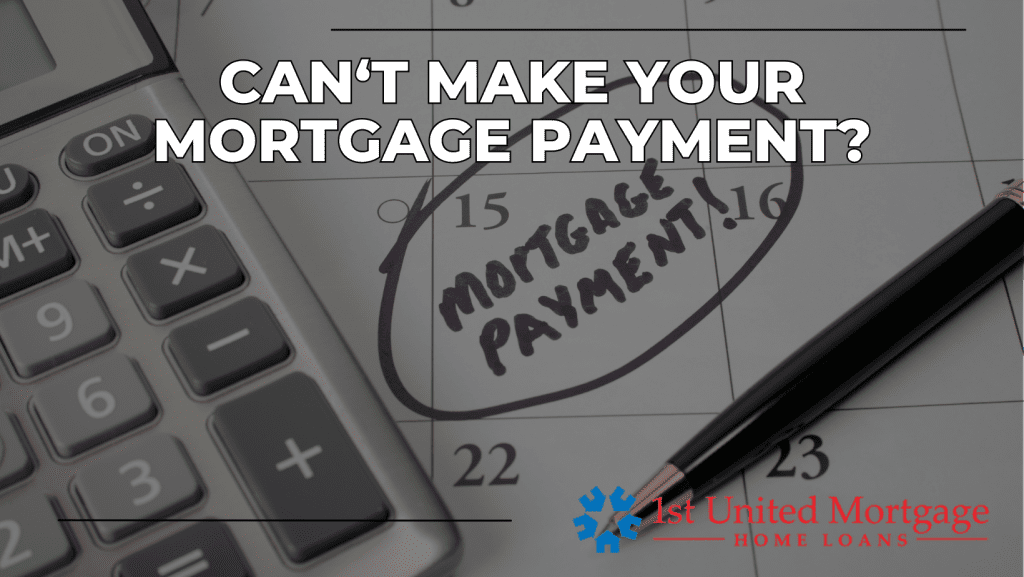
Life can throw unexpected financial challenges your way, making it difficult to keep up with mortgage payments. If you find yourself in this situation, it’s crucial to understand your options to avoid foreclosure and protect your financial future. At 1st United Mortgage, we’re committed to helping homeowners navigate these tough times with the right strategies and support.
Immediate Steps to Take
1. Contact Your Mortgage Servicer
The first step is to contact your mortgage servicer, whose number can be found on your monthly statement, mortgage loan coupon book, or their website. If you’re unsure who your servicer is, a HUD-approved housing counseling agency can assist you.
When you reach out to your servicer, be prepared to discuss:
– The reason you are unable to make your payments.
– Whether your financial difficulty is temporary or permanent.
– Your income, expenses, and other assets.
– Any special circumstances, such as military service or permanent change of station (PCS) orders.
2. Complete a Mortgage Assistance Application
Your servicer may require you to fill out a mortgage assistance application. This helps them assess your situation and determine the loss mitigation options available to you.
3. Consult a HUD-Approved Housing Counselor
HUD-approved housing counselors provide free, expert assistance. They can help you understand your options, work with your servicer, and manage other financial issues that may be impacting your ability to pay your mortgage. To find a counselor, visit HUD’s website or call the HOPE™ Hotline at (888) 995-HOPE (4673).
Potential Solutions
Here are some common options that might be available to you if you’re struggling to make your mortgage payments:
1. Forbearance
Forbearance allows you to temporarily reduce or suspend your mortgage payments. This option is typically suitable for short-term financial hardships. During the forbearance period, your lender agrees to refrain from initiating foreclosure. However, you’ll need to repay the missed payments, either in a lump sum or through a repayment plan, once the forbearance period ends.
2. Refinancing
Refinancing your mortgage can lower your monthly payments by securing a lower interest rate or extending the loan term. This option is best if you have a good credit score and significant equity in your home. Be aware that the refinancing process can take several weeks and involves origination fees.
3. Loan Modification
A loan modification involves changing the terms of your existing mortgage to make payments more affordable. This might include extending the loan term, reducing the interest rate, or adding missed payments to the loan balance. Loan modifications are often reserved for borrowers with a demonstrated ability to meet the modified terms.
4. Repayment Plan
If you’ve missed a few payments but can now resume regular payments, a repayment plan might be a good solution. This involves paying your regular mortgage amount plus a portion of the past-due amount each month until you are caught up.
5. Short Sale
In a short sale, your lender agrees to let you sell your home for less than what you owe on the mortgage. This option can be a way to avoid foreclosure and its severe impact on your credit score. While it will still negatively affect your credit, a short sale is generally less damaging than a foreclosure.
6. Deed in Lieu of Foreclosure
A deed in lieu of foreclosure allows you to transfer ownership of your home to the lender in exchange for being released from your mortgage obligations. This option can be less damaging to your credit than a foreclosure and may even include a relocation assistance payment to help you move.
7. Renting Out Your Home
Renting out your home can generate income to cover your mortgage payments. This option is viable if you can find a tenant willing to pay enough rent to cover your expenses and you are able to move elsewhere. Keep in mind the responsibilities and potential costs associated with being a landlord.
Avoiding Scams
Be wary of foreclosure scams. Scammers often promise to save your home for a fee but deliver nothing in return. Red flags include requests for upfront payments, guarantees of modified loan terms, or instructions to stop paying your mortgage and pay them instead.
Always work directly with your mortgage servicer or a HUD-approved housing counselor. These legitimate resources are available at no cost to you.
At 1st United Mortgage, we understand the stress that comes with financial difficulties and the potential loss of your home. If you’re struggling to make your mortgage payments, don’t wait—explore your options and seek help immediately. You can find a solution that works for your situation by taking proactive steps and utilizing available resources.
For personalized assistance and expert guidance, contact 1st United Mortgage at (931) 548-1985 or visit our website. Our team is here to support you through every step of the process, ensuring you make informed decisions to safeguard your home and financial well-being.
